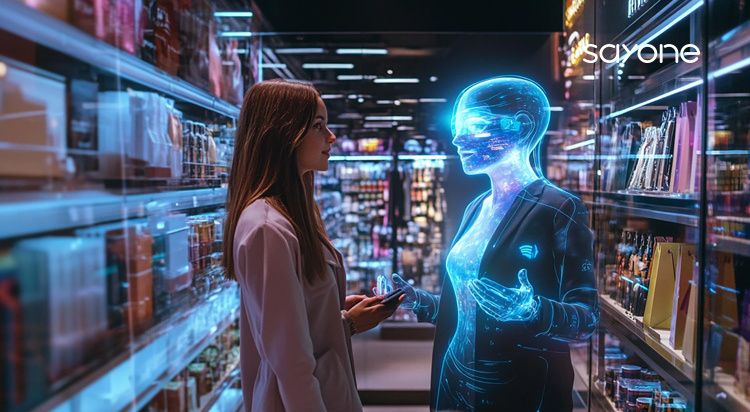
Subscribe to our Blog
We're committed to your privacy. SayOne uses the information you provide to us to contact you about our relevant content, products, and services. check out our privacy policy.

Jibu JamesAugust 5, 20256 min read

Generating table of contents...
Struggling with manual processes that drain your retail team's productivity? You're not alone. Let's see how AI-powered workflow automation can transform your operations from intelligent inventory management to automated employee onboarding. Discover practical applications, real-world benefits, and actionable strategies
Integrating AI into retail workflows represents a transformative shift, enabling retailers to achieve unprecedented levels of efficiency and adaptability. The journey begins with aligning AI technologies like machine learning, natural language processing, and computer vision with existing processes such as inventory management, customer engagement, and operations monitoring.
AI integration typically involves embedding AI tools into legacy systems via APIs or cloud-based platforms, ensuring real-time data flow and actionable insights across departments.
Retailers must also prioritize robust data security and compliance to safeguard customer information. Despite these obstacles, the benefits are substantial AI streamlines repetitive tasks, enhances decision-making with predictive analytics, and enables retailers to personalize interactions at scale.
AI-powered internal agents play an essential role in automating and optimizing retail workflows by handling routine tasks, coordinating resources, and ensuring smooth operations.
These agents can intelligently manage appointment bookings customer inquiries, and task routing, freeing employees to focus on more strategic activities. When combined with enterprise task management software, retailers gain better visibility into workloads, dependencies, and execution across departments, ensuring AI-driven actions align with broader operational goals.
One example is AppointMate, developed by SayOne, which specializes in automating booking workflows to improve scheduling accuracy and operational efficiency. However, AI agents extend beyond booking management to automate supply chain coordination, inventory checks, and internal communications, adapting dynamically to business needs.
By integrating such agents, retailers can reduce manual errors, accelerate response times, and deliver consistently reliable service at scale.
Key Features of AI Agents in Retail Workflow Automation
AI takes the hassle out of meeting regulatory requirements and modernizing legacy code in retail businesses. With AI tools, you can automate compliance checks, monitor policy updates, and make sure your records are always audit-ready.
AI algorithms scan for errors and outdated code, suggesting updates that keep your systems secure and up to date. This means you’ll spend less time trying to keep up with changing regulations or struggling with old software. Instead, you get streamlined compliance, stronger data protection, and a tech stack that’s ready for what’s next.
The chatbot draws on a centralized knowledge base and learns from frequent questions, improving over time. This not only helps employees onboard faster but also keeps everyone updated on procedures and product details. As a result, you cut down on confusion and time wasted searching for information, letting your team focus on delivering better service to customers.
Automated inventory management and demand forecasting with AI puts you in control of your stock and ordering decisions. Instead of guesswork, you act on real-time data from your stores and supply chains. AI systems track sales, monitor inventory levels, and spot trends, helping you avoid overstocking or running out.
Machine learning analyzes historical buying patterns and external factors, so you can predict demand more accurately and update orders with confidence. You gain clear visibility into what products to restock, when, and in what quantities, letting you cut waste, reduce costs, and better meet your customers’ needs.
They alert your team right away, letting you respond quickly to prevent losses. Unlike manual checks, AI solutions learn and adapt, staying effective even as fraud tactics evolve.
This means you can reduce false alarms, catch problems faster, and keep your data and revenue safe.
The future of retail automation is shifting from completing simple tasks to running predictive, intelligent systems. You can expect generative AI to not only create hyper-personalized customer outreach but also to help develop new products. Technologies like 5G and edge computing will enable real-time data processing for innovations like autonomous stores and supply chains that adapt instantly.
The goal is to build a seamless link between your online and physical stores, making operations faster and more responsive to customer needs .
Key Developments on the Horizon
Contact us today!

We're committed to your privacy. SayOne uses the information you provide to us to contact you about our relevant content, products, and services. check out our privacy policy.

About Author
Jibu James is the Team Lead at SayOne Technologies. He is passionate about all things related to reading and writing. Check out his website or say Hi on LinkedIn.

We collaborate with visionary leaders on projects that focus on quality